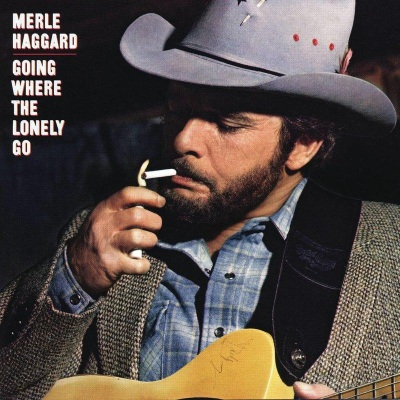
Going Where The Lonely Go
by Thom Jurek Recorded after his Columbia hit Big City, Going Where the Lonely Go is one of Merle Haggard's most criminally overlooked recordings. Recorded in 1982, the vibe is one of Haggard's most laid-back albums, co-produced with Lewis Talley, one of Nashville's kings of understatement (not that there are many). Haggard wrote over half the album, the rest comprised of two songs by his then-wife, Leona Williams; a co-write with Little Jimmy Dickens; Willie Nelson's "Half a Man"; and Jimmy Davis' "Nobody's Darlin' but Mine." But it is Haggard's songs that make this a stellar outing. The title track is a piece of pure country poetry. A painfully slow 4/4 time signature fronted by a bassline, adorned by a three-chord pattern, and filled by slippery piano lines, Haggard sings, "Rollin' with the flow/Goin' where the lonely go/Anywhere the lights are low/Goin' where the lonely go/Makin' up things to do/Not runnin' in all directions tryin' to find you/I'm just rollin' with the flow/Goin' where the lonely go/And I've got to keep goin'/I can't lay down/Sleep won't hardly come/Where there's loneliness all around/I've got to keep goin'/Travellin' down this lonesome road/I'll be rollin' with the flow/Goin' where the lonely go." As Haggard gets to the bridge, a steel guitar and lead guitar trade lines as strings fall in from the edges and cascade around his gorgeous, bluesy voice. The next track, "Why Am I Drinkin'?," is pure honky tonk blues, full of heartbreak and resignation when he asks the question, "Is love just another word for memory?/And is love just another word for pain?/The question is love really the answer/And if so why is love so much to blame/If love is what we're really after, then why am I runnin' away?/And why am I drinkin'/Why am I hurtin' this way?" The guitars and fiddles wend their way around Norm Hamlett's gorgeous pedal steel and drive home the desolate edge in the song. "I Won't Give up My Train," another country ballad, is particularly poignant, as Haggard addresses the metaphor of his life in music via a brakeman who is married and probably won't be for long, because his wife is tired of always waiting for him. Hargus "Pig" Robbins' piano is unmistakable as it ushers in the a narrative of paradox, contradiction, and loss. When Hag sings, "The baby came in April in Chicago in the pourin' rain/With 12 black cars and empty tank/With three box cars and an empty sack of mail," we can hear Jimmy Rogers in the grain of his voice, calling from out in the freight yards of history. Other notables are the truly moving "Shopping for Dresses (With No One to Wear Them)," written with Dickens, and "For All I Know," another broken-love song from the other side of love's great divide. Haggard and the Strangers were one of the tightest and most sophisticated bands in country music, inspired by the elaborate arrangements of Bob Wills' band, to the point where Haggard's music from this period transcends country music in its appeal and elegance. It's a pity this one didn't get the notice it deserved -- it's a masterpiece.

